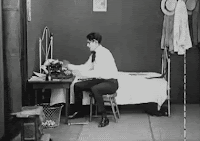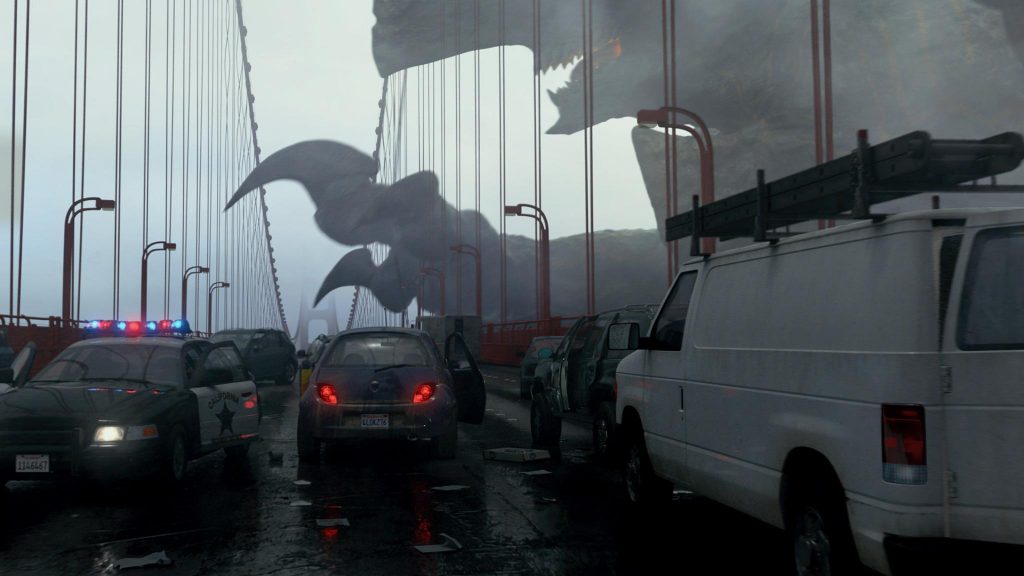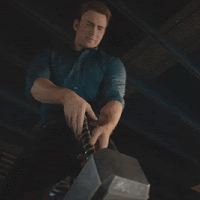Well, if all goes well, we’re making a big time jump here. All the past things I’ve been blathering on about—plot, characters, story, theme—these are all elements that we can spend a day or three on. Maybe even less, if they’ve been fermenting in my head.
But between last week and this week, well… hypothetically a lot of time has passed. I’m really, really hoping you didn’t write an entire first draft in a week. If you did… well, that’s another issue we need to discuss. I’m hoping you took your time, within reason, and we are—hypothetically—a month or two or maybe even six later.
You have a first draft now. And it’s a beautiful thing. Maybe the file is so big it’s an entire meg on your computer. An entire megabyte of your words. I know that might sound laughable or dismissive, but seriously—you need a lot to hit a one megabyte Word file.
But…
(yeah, here comes the but)
…it needs editing. No probably. There’s a chance you wrote a perfect, flawless first draft, but more than likely… you didn’t. I haven’t yet and I’ve been doing this for a while.
It’s okay, though. Everybody needs to edit. Everyone. Anyone who says they don’t is either A) lying to you or 2) delusional. Our work needs editing and revising. If you remember waaaay back at the beginning of the A2Q, I talked about how ideas need to be cut and polished like diamonds? Well, that’s what we’re doing now. Figuring out what needs to be cut and then giving it all a good polish.
Again… this is okay. Don’t worry. Every book you’ve ever loved has gone through this process. And we’re going to go through it so this book can be one other people can love.
Ready?
 First up, the easy part. This is a 100% complete draft, right? Beginning, middle, and end? I’m not going to get a hundred pages in and find blank space or notes to myself like [FIND WHAT THESE ARE REALLY CALLED] or [ASK ELLEN HOW TO DO THIS]. There’s nothing wrong with doing that on a first pass—I do it all the time—but before I start editing I need to fill in those spaces in my book with actual, y’know, book.
First up, the easy part. This is a 100% complete draft, right? Beginning, middle, and end? I’m not going to get a hundred pages in and find blank space or notes to myself like [FIND WHAT THESE ARE REALLY CALLED] or [ASK ELLEN HOW TO DO THIS]. There’s nothing wrong with doing that on a first pass—I do it all the time—but before I start editing I need to fill in those spaces in my book with actual, y’know, book.
So, again… this is a 100% complete draft, right?
Fantastic.
Before diving in, may I suggest taking some time away from your book. You don’t want to finish a draft, then turn right around and start the next one. We want to get a little space, and let things fade in our mind a bit. I don’t want to be looking at the manuscript in my head, I want to be seeing the one in front of me—the one everybody else is going to see. We’re going to need some stark honestly for this, so I want to be clear what’s really there.
One tip for this—I’d suggest switching the font. Go from Times Roman to Courier. If you’re one of those folks who likes to write in Comic Sans, switch it back to Times. A different font is going to make everything sit differently on the page and it’ll make you actually read what’s on the page. You’ll become very aware of what is and isn’t there, and catch a lot of stuff that’s been sliding past you.
Once you’ve taken some time away, changed the format… read it. Just read through this new manuscript with those fresh eyes. Maybe make some quick notes, but for now just read it. Again—don’t remember it, read it. Try to see what’s really there on the page.
Now, I’ve talked about editing a bunch of times. It’s a big umbrella that a lot of things fall under, many of which I think can get broken down into three categories or types. It is my humble opinion that one of the big reasons people have issues with editing is they get these different types confused because they never get more specific than “editing.” I want to talk about each of these three types of editing and maybe give a few examples of each. You may have heard of one or two of them.
First up is story editing. This is when we try to improve the plot and story by reorganizing different elements, clarifying them, maybe even adding to them. Sometimes we might even add all-new elements.
 Second is what I’m going to call reductive editing. This is when we’re cutting things, usually to tighten up dialogue, descriptions, and maybe even to simplify larger elements a bit. Sometimes, in all honesty, we’re just cutting to get closer to a certain word count.
Second is what I’m going to call reductive editing. This is when we’re cutting things, usually to tighten up dialogue, descriptions, and maybe even to simplify larger elements a bit. Sometimes, in all honesty, we’re just cutting to get closer to a certain word count.
Third is copyediting. This is when we’re correcting things throughout the manuscript. Formatting. Spelling. Grammar. The nuts and bolts things that are still important because they’re holding things together.
You may notice there seems to a bit of overlap here. I’d say it’s a little less “overlap” and a little more “weaving between lanes in high traffic,” as we’ll see. You may have also heard different names or definitions for these. Look, I never claimed to be an English major or anything. If you’ve heard it called something else, cool. I’m just trying to make this easy to distinguish.
Anyway… let’s go through these in a little more detail.
We’ve kind of talked about story editing already, in a sense. When we first had that pile of ideas and notes and we started sifting and arranging them into an outline—that was story editing. Trying to find the best order for things, the best way to introduce different elements, and so on. That’s what this is—taking what we’ve already got and figuring out if we can make it even better.
Yeah, we’ve already done that. But now we’ve written everything out. We’ve got a better sense of the characters and the size of the events and how they’re going to land with my audience. Maybe that needed a little more description than we thought and that bit needs a lot less. And maybe we’ve realized some of this… doesn’t really serve any purpose.
This is one of the reasons we want to look at this with fresh eyes. So I can see where problems have developed. Or maybe they were there all along, but I couldn’t recognize them until it was all here in front of me.
F’r example, now that I’ve looked at all of this again, does it have a good dramatic structure? Does the tension start low and rise throughout the book (maybe with a few dips and drops here and there for our heroes)? How’s the pacing? Does it feel like there are any slow parts that just stretch on a little too long with nothing actually happening?
That’s a good one right there? Are things happening? Are events pushing the plot and my characters’ stories along? Or are they stalling out in places. Are people talking or thinking about doing things more than they’re… y’know, doing things?
This is story editing. Taking an honest look and deciding what story elements do and don’t need to be there. Or maybe just need to shift to somewhere else.
 Also—don’t get scared here if it looks like you need to make big changes. If it turns out my outline was wrong, then it was wrong. So what? The first draft’s done. Make a new outline if you want and then write to that one. I’ve written a complete first draft and then gone back and completely rewritten the ending, or ripped out whole chapters. It happens. Don’t worry if it does.
Also—don’t get scared here if it looks like you need to make big changes. If it turns out my outline was wrong, then it was wrong. So what? The first draft’s done. Make a new outline if you want and then write to that one. I’ve written a complete first draft and then gone back and completely rewritten the ending, or ripped out whole chapters. It happens. Don’t worry if it does.
Next up is what I’m calling reductive editing. This is something I’ve talked about a lot here on the ranty blog. We all get a little wordy in our first drafts. We use a few too many adverbs. We describe things with a bit too much detail. We let conversations go on and on. And we also tend to…
Okay, a thought exercise for you. If I said you no-questions had to get rid of three characters in this book—three characters with names and/or dialogue, who would you pick? Why did they jump right to mind? Is it because you knew getting rid of Wakko wouldn’t mean too much rewriting? Or because Dot and Yakko could be merged into one character (Dakko? Yot?) pretty easily? Because really… they don’t do that much.
We all do this. We bulk up characters and their descriptions and subplots, letting them take up a lot more space on the page than their actual contributions might warrant. I’m not saying every single character has to be a vital linchpin to the plot, but… well, how fast did you come up with three characters you could cut?
And I’m sure some folks reading this are thinking “Ha ha, good thing there’s absolutely no literary fat in my manuscript. Every single element is perfectly balanced and artistically necessary.” Which, yeah, there’s a chance it is. Maybe.
But remember this. As a first time author—hell, even as a successful one—the odds of a sale are better with a smaller, tighter book. No one’s saying a publisher won’t look at something big, but if I can trim two or three thousand words off my manuscript it can make a difference. Even just a psychological difference, when they look at that cover page and see 98K words instead of 101K words.
Finally, there’s copyediting. The often long and painful process of going through a manuscript line by line, word by word, and making sure everything’s correct. I’m using the correct words, spelled the right way. I’ve got commas where I need them and all my dialogue’s got quotation marks at both ends. Indents and spacing and page numbers.
 People get contentious about this for a few reasons. Some folks will declare writing doesn’t have rules and they can do whatever they want, however they want. Others say it’s irrelevant because the genius of their writing will shine past all that to illuminate the heart and soul of the reader. And still others say, well… I mean, isn’t that the publisher’s job? They’ve got people for that, and they know this isn’t going to be perfect.
People get contentious about this for a few reasons. Some folks will declare writing doesn’t have rules and they can do whatever they want, however they want. Others say it’s irrelevant because the genius of their writing will shine past all that to illuminate the heart and soul of the reader. And still others say, well… I mean, isn’t that the publisher’s job? They’ve got people for that, and they know this isn’t going to be perfect.
There’s a bunch of problems with all these views, biggest among them… what if I plan on publishing it myself? If I’m the publisher I need to be able to do all of this. And if I want someone else to publish it… well, why would they bother to look at it if I can’t be bothered to give them my best work? I mean, if they get those first fifty pages and it’s clear I didn’t even bother to fix my spelling mistakes, what else didn’t I bother with?
And to be clear—there are times my story might require typos and odd grammar. I occasionally spell words in odd ways. I sometimes take certain stylistic liberties with commas when I write. So do a lot of writers I know. But it’s always very clear this is a deliberate thing—I know I’m doing it and why I’m doing it. But these are exceptions, and exceptions by their very nature are rare things.
So there’s a bunch of editing thoughts. Let’s apply some of them. Remember that first page and a half of our werewolf novel I wrote last time…?
++++++++++
Chapter One
“Luna!”
Phoebe sifted through the laundry pile again, willing the black top to appear even though it hadn’t the last three times she’d looked. “Luna,” she bellowed again.
Upstairs the sound of the shower finally stopped and she heard the thump of feet on the wooden floor. The bathroom door creaked open. “What?”
“Where’s my black top? The one with the ribbing?”
“I’m trying to get ready,” her little sister growled. “I’m going out!”
“So am I! Where is it?”
“How should I know?”
“You borrowed it last night. You promised you’d wash it.”
Silence. Then the bathroom door creaked again quietly.
“Luna!”
“What?” Her voice echoed in the small house.
“Where is it?”
A sigh echoed down the stairs. “I’ll get you a new one.”
“You’ll what?”
“I kind of… misplaced it.”
“You what?”
“I lost it, okay. I said I’ll get you a new one.”
“Goddammit. I wanted it tonight. It fits under my armor.” She looked at the leather sleeves, vest, and gorget piled on the bed. Her mom’s old hand-me-down armor. Stained dark brown with years of oil and sweat and blood that sank in before it could be cleaned off.
“Wear the green one.”
“It’s long-sleeved and I wore it last night. It stinks.”
“It’s not like anyone’s going to complain.”
Phoebe bit back a sigh of her own sigh and marched over to the hamper of dirty clothes. “How did you ‘misplace’ lose it?”
“I was at a party.”
“That’s not an answer.”
“Yes it is,” Luna sang down the stairs. “I’m getting back in the shower now.”
“We’re going to talk about this later.”
“Whatever.” The bathroom door creaked shut and hot water started to gush flowed again.
They’d have to talk about that too. The water bill and the gas bill had been high last month. Phoebe felt pretty sure Luna’s long showers were a major big part of that.
She pulled the green top from the hamper. It had been warm last night, especially under all the leather, and she’d sweated a lot. The top was still damp, and it reeked. But it was that or she could try to find a Henley or turtleneck that wouldn’t bunch up under the armor and slow her down.
She sure as hell wasn’t going to be some B-movie cliché, hunting werewolves with nothing on but a leather vest.
++++++++++
Let’s talk about some of the tweaks.
 As far as story editing goes, you’ll notice I changed “mom’s old armor” to “hand-me-down armor.” Now it feels less sentimental and more a necessity from lack of funds—a subtle hint at their financial status.
As far as story editing goes, you’ll notice I changed “mom’s old armor” to “hand-me-down armor.” Now it feels less sentimental and more a necessity from lack of funds—a subtle hint at their financial status.
For reductive editing, I snipped some adverbs and redundant words. Only seven altogether (when we count what I added in). Doesn’t seem like much, but this was only a page and a half. At that rate, we’re talking about 1,400 words cut out of a 300 page manuscript—closer to 294 pages at that point. And those were really minimal cuts, weren’t they?
There wasn’t a lot to copyedit because, well, I checked it all as a regular part of the blog post last time. But I remember there were two or three typos in it, because I scribbled that all out really fast. One of them was my thumb not hitting the space bar hard enough so two words ran together.
Also worth mentioning you don’t have to do all of this at once. Some people like to just work in a single document through the whole process. Others write, save it as a draft, do an editing pass, save it as a draft, do another editing pass, save a draft, and so on. I’ve talked about my own method before, but figure out what works for you.
Y’see Timmy, that’s one of the toughest thing about trying to explain editing—even just these small tweaks. A lot of it does just come down to figuring it out. Yeah, we can study grammar, but so much of the raw art of it is just experience. Being honest with myself about my own work. Writing a lot. Reading a lot. Making mistakes. Learning from them. It’s how we get a sense of which words fit and which ones don’t. And like so much of this, it’s a flexible thing. Just because it worked last time doesn’t mean it’ll work every time.
In the end, the goal is to make this the best I possibly can. Not the best first draft or the best it can before I get bored. Ugly truth is, it’s going to be work, it’s going to take time and there’ll be points when you go back and forth about cutting or keeping things. That’s just the way it goes. But it’ll get slightly easier every time. I promise.
…at least, until you try to write a more complex book.
But we’ll get to that another time.
I think I’ve still two or three post left in this whole big process thing. Hopefully you’re still interested to read them. But next time I may take a quick break from the A2Q to talk about some related ideas.
Until then, go write.
And edit.











